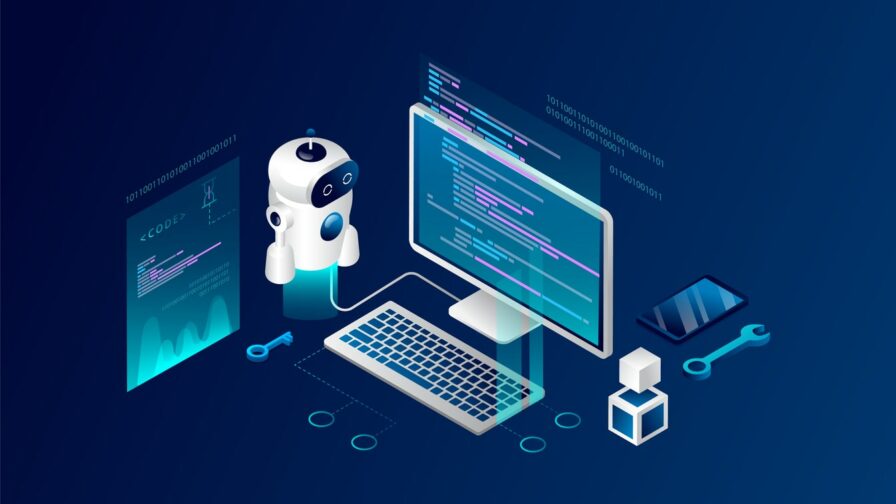
A new AI coding tool enters the race: let’s take a closer look at Devin, a new AI coding assistant (currently in early access) that has already been nicknamed the “First AI Software Engineer”.
Developed by Cognition, a pioneering US startup, Devin emerges as the world’s premier fully autonomous AI coding tool. But what sets Devin apart from its predecessors like chatGPT and GitHub Copilot? Let’s navigate through the realm of AI coding assistants to uncover the distinctive capabilities that define Devin.
The Current AI Coding Assistant Scene
Recent years have witnessed a surge in AI-driven coding assistants. Tools such as chatGPT and GitHub Copilot have become indispensable aids for programmers, offering code generation, completion suggestions, and error detection. However, these tools operate within the defined boundaries of preexistent LLMs, excelling in streamlining repetitive tasks or providing insights based on existing data. These tools, despite their original limitations, are being adopted by companies and developers at an outstanding rate, and are even starting to replace the traditional code-solving references such as Stack Overflow.
Introducing Devin: The Comprehensive AI Engineer
According to their creators, Devin transcends the limitations of its counterparts, offering a holistic approach to AI coding assistance. Unlike other tools, Devin isn’t confined to mere code suggestions; it’s engineered to tackle entire development projects from inception to fruition. It doesn’t just suggest code and find bugs, it basically builds the final output on its own.
Here’s what sets Devin apart:
End-to-End Development: Devin possesses the capability to transform project outlines into fully functional applications, encompassing tasks ranging from requirement comprehension to code composition, bug resolution, and application deployment.
Autonomous Learning: Operating autonomously, Devin harnesses resources like API documentation and online tutorials to assimilate knowledge and complete tasks independently.
Self-Sufficient Problem-Solving: Beyond code generation, Devin adeptly tackles intricate engineering challenges, devising solutions within its secure sandbox environment.
A Comparative Analysis: Devin vs. Traditional AI Coding Assistants
| Feature | Devin | Other AI Coding Assistants (e.g., chatGPT, Copilot) |
| Functionality | End-to-end development | Code completion, suggestion, error identification |
| Level of Autonomy | High – can work independently | Low – requires constant human input |
| Learning Capabilities | Learns from various resources like API documents | Learns from existing code patterns |
| Problem-Solving | Can solve complex engineering problems | Limited to code-related problem-solving |
Implications: Advancement or Adversity for Programmers?
Devin’s prowess prompts a pivotal question: does it aim to supplant human programmers? While Devin streamlines numerous tasks, it’s unlikely to eliminate the need for human expertise due to:
Domain Knowledge: Programming demands a profound comprehension of the problem domain, an aspect where Devin may lack the nuanced understanding possessed by seasoned human programmers.
Creativity and Innovation: Programmatic endeavors often necessitate inventive problem-solving, an area where Devin, despite its learning capabilities, may encounter challenges requiring unconventional approaches.
Human Oversight: Critical aspects such as testing, debugging, and ensuring code quality remain reliant on human intervention.
Collaboration or Bane?
The Rise of Devin: A Boon or Bane for Programmers?
Devin’s arrival throws gasoline on the already heated debate surrounding AI and its potential impact on the programming profession. Unlike its predecessors, Devin isn’t confined to code completion or bug identification. It aspires to create entire products, autonomously searching for and applying fixes, a capability that sets it apart from existing tools. This newfound level of automation has some fearing a future where AI replaces human programmers altogether.
The Potential Benefits: A Programmer’s Dream Team Player?
Proponents of Devin paint a rosy picture. By automating repetitive tasks like bug fixing and code generation, Devin can become a programmer’s dream team player. Here’s how:
- Enhanced Developer Productivity: Imagine a world where programmers are freed from the drudgery of repetitive tasks. Devin can handle those, allowing programmers to focus on the strategic aspects of software development – design, architecture, and the creative problem-solving that truly sets them apart.
- Accelerated Development: Devin’s ability to work autonomously has the potential to significantly reduce development timelines. This translates to faster product launches and quicker time-to-market advantages for businesses.
- Democratization of Programming: Devin’s user-friendly interface could potentially open doors for non-programmers to dabble in application development. This could foster greater innovation and lead to the creation of entirely new categories of software.
The Concerns: A Job Market in Flux?
However, Devin’s rise also raises valid concerns:
- Job displacement: Some fear that AI tools like Devin could automate programmers out of a job entirely. While repetitive tasks might be at risk, the need for human expertise in areas like design, problem-solving, and domain knowledge is unlikely to disappear.
- Ethical considerations: Bias in AI code is a well-documented concern. If Devin is left unchecked, it could perpetuate or even amplify existing biases in software.
- Impact on the workforce: The transition to a more AI-driven development landscape will require workforce retraining and adaptation. How the programming job market adapts to this new reality remains to be seen.
Conclusion
While Devin and other AI tools don’t signify the obsolescence of human programmers, they usher in an era of symbiotic collaboration and continuous learning. Companies should continue to train their IT employees to understand and leverage new AI tools responsibly, acknowledging their limitations, risks, and creating best practices.
AI coding tools like Devin are here to empower programmers, not replace them. Imagine a future where programmers spend less time on repetitive tasks and more time on innovation, tackling complex challenges, and pushing the boundaries of software development. With Devin (or any other AI coding tool you like) as a partner, programmers can focus on the creative spark, the human touch that truly differentiates exceptional software.
